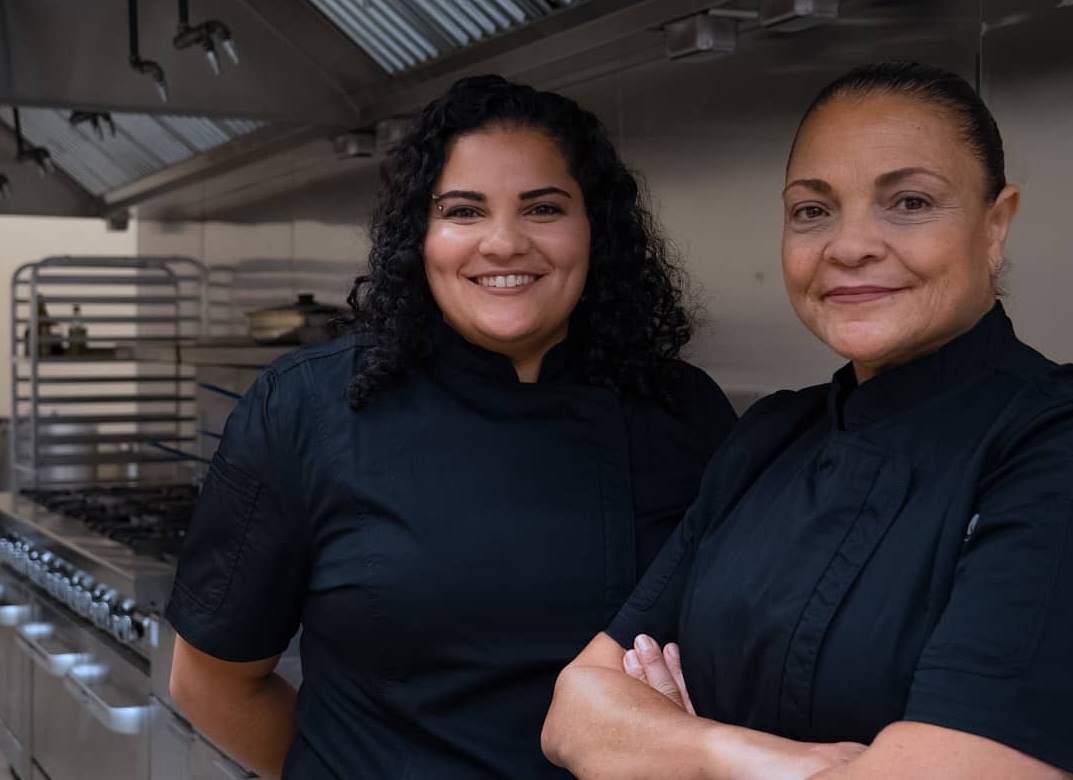The restaurant brings the flavors of Egypt to Somerville Avenue
(Somerville Wire) – Sahar Ahmed and her daughter Dina are the team behind Koshari Mama, a vegan, Egyptian street food eatery that serves up authentic cuisine. Ahmed, who has been passing down family recipes from different generations, says that food brings people together and acts as a valuable form of connection. Here, I asked her about the koshari, a national dish, that they prepare, and what makes her food, which she says nurtures the soul, so unique.
What inspired you to open Koshari Mama? Where does your family come from in Egypt, and what has it meant to them to come to Somerville and run a business here?
The inspiration for opening Koshari Mama was from the memory of my mom. Her name was Salwa. Growing up, my mother cooked to bring people together. She came to the U.S. as an immigrant, and food was her way of keeping her and us connected to our culture. She was homesick, and food was her way of sharing a part of her. My daughter Dina and I wanted to continue my mom’s legacy, so we decided to open Koshari Mama. I was born in Cairo, Egypt, and Dina was born in the United States. We have been in Somerville for two and a half years. We started out at Bow Market as a pop-up and then moved to our own brick and mortar location on Somerville Ave. We are thrilled to be part of the Somerville community, and we are happy we chose this city. Somerville is a diverse city, and we feel welcomed.
What is the culture of Egyptian street food like? Egypt serves as a link between Africa and the Middle East; how is this connection reflected in the food that people eat?
Street food is for everyone in Egypt, and the street food culture is a vibrant one. It’s made with local, affordable ingredients that are satisfying and accessible to all. The similarities in the ingredients in North Africa and the Middle East is reflected in the food and this is a good connection … it’s familiar, even though each country has its own little twists. Those twists could be using different spices, or preparing the dish in a different way. But it’s basically playing with the same ingredients. Food tells a story, and every time a recipe goes from one culture to the next, it adds another layer to that story.
Can you highlight some of your favorite dishes, what ingredients go into them, and how they’re prepared?
My favorite dish is koshari. It is the ultimate street food, and it is made up of rice, lentils, pasta, and chickpeas, topped with crunchy fried onions and a tomato based sauce. Another favorite of mine, which is also very typical street food, is taamiya, which is also known as falafel. Egyptian taamiya is a little different from the falafel known in the U.S. It has a lot of greens and fava beans. Our taamiya also happens to be gluten free.
Koshari Mama is also a vegan restaurant. What made you decide to serve only vegan food?
I am vegan and my daughter is vegetarian. We decided to make Koshari Mama a vegan restaurant to highlight the many ways you can make vegan food without compromising on taste. We are constantly working on recipes and altering and changing to get the best and most authentic taste.
You are a family owned restaurant, a mother and daughter team. Can you tell us a bit about how you work together, how you pass on recipes, and what this familial connection means to you?
My daughter and I work side by side. I taught her what my mom taught me, and she is a trained chef who has worked in the industry. We both learn from each other, and this connection means the world to me. I am hoping that I can offer Dina what my mom offered me; favorite family recipes, koshari, falafel, homemade dips, desserts and basically the love of food and the preparing of food for others. She taught me that food is the ultimate connector; it tells a story. I ultimately learned that although people are different, we have so much in common, and we can share this through food.
This article is syndicated by the Somerville Wire municipal news service of the Somerville News Garden project of the Boston Institute for Nonprofit Journalism.
All Somerville Wire articles may be republished by community news outlets free of charge with permission and by larger commercial news outlets for a fee. Republication requests and all other inquiries should be directed to somervillewire@binjonline.org. Somerville Wire articles are also syndicated by BINJ’s MassWire state news service at masswire.news.
SUBSCRIBE TO THE SOMERVILLE WIRE EMAIL NEWSLETTER: https://eepurl.com/hpBYPv
Check out all our social media here: https://linktr.ee/SomervilleWire.
Shira Laucharoen is assistant director of the Boston Institute for Nonprofit Journalism and assistant editor and staff reporter of the Somerville Wire.









